Showing a dose-dependent effect, consuming 600mg of AP per day two weeks before the UV exposure could better control the extent of skin redness as compared to the placebo group.
Published in Nutrients, the study studied Applephenon, a commercially available AP made by Asahi Breweries.
A total of 65 healthy women in their 20s to 30s took part in the study at the Dermis Research Centre in Osaka.
Depending on the group that they were assigned to, they took either the placebo, or 300mg of AP per day, or 600mg of AP per day.
Two weeks later, they were then exposed to a 1.5 MED UV-irradiation on their arms, and kin redness was measured by their erythema value.
The placebo group was most affected by the UV exposure, while the other two groups saw a lesser impact.
Ten-week follow-up
Post-UV exposure, a 10-week follow-up was conducted, where the subjects’ erythema and melanin values were measured.
Results showed that AP consumption exerted a bigger improvement in erythema value as compared to melanin value.
For instance, by the end of the study, the erythema value of the high AP group was 176.2 ± 40.3, while that of the low AP group was 184 ± 26.6, and that of the placebo was 187.6 ± 35.4.
As for the melanin value, there was no huge difference between the groups.
The melanin value of the high AP group was 172.5 ± 31, slightly lower than the low AP group at 174.5 ± 23.3, and the placebo at 175.7 ± 32.1.
Procyanidins at work
Procyanidins were identified as the key component that inhibited pigmentation by UV irradiation.
Procyanidins is also derived from grape seeds, pine bark, and cacao. It is reported to have strong protective effects against free radicals.
In this RCT, the AP samples contained 63.8% of procyanidins.
“In the current study, we demonstrated that AP oral administration, specifically procyanidins, was effective in inhibiting pigmentation by UV irradiation,” Toshihiko Shoji, one of the lead authors of the study, concluded.
“The current study indicated that apple procyanidins protected against the oxidative stress caused by UV irradiation and inhibited melanin synthesis in melanocytes,” he said.
Source: Nutrients
Administration of Apple Polyphenol Supplements for Skin Conditions in Healthy Women: A Randomized, Double-Blind, Placebo-Controlled Clinical Trial
https://doi.org/10.3390/nu12041071
Authors: Toshihiko Shoji, et al


